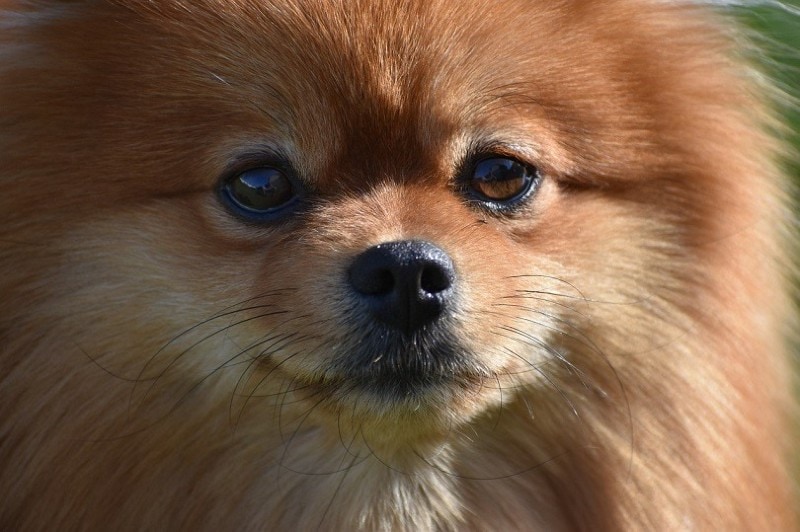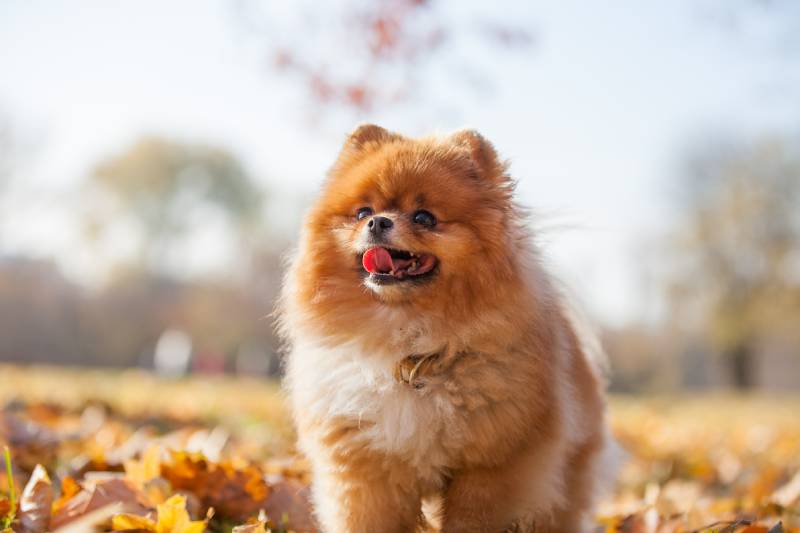Pomeranians are an adorable dog breed. They are tiny, energetic, loving, and great lap dogs. As one of the most popular breeds in the world today, they have bigger-than-life personalities, long fur, and tiny bodies that beg to be cuddled.
However, they also come with quite a few common health problems. Some scientists speculate that their extreme popularity has led to poor breeding practices, which result in the health problems you see in many Pomeranians today. In this article, we’ll examine some of those health problems and more.
The 7 Common Health Problems in Pomeranians
1. Collapsed Trachea
Tracheal collapse is common in Pomeranians due to their petite necks and windpipes. This can be inherited from your Pom’s parents or can be caused by a collar that is too tight.
Luckily, a collapsed trachea is usually mild and can be treated easily by your vet. However, if the collapse is severe, surgery may be required. You can prevent a collapsed trachea from happening to your Pom by ensuring the collar you use to walk your pet isn’t too tight or by using a harness instead of a collar.
Obese dogs are more prone to tracheal collapse, so try to feed your Pomeranian a high-quality, strictly scheduled diet. Sadly, nothing can be done if the tracheal collapse is genetic.

2. Patella Luxation
Another common health issue with Pomeranians is patella luxation. It affects many small breeds and occurs when the dog’s kneecap temporally slips out of place, then pops back in. It’s most often caused by abnormal bone formation but can be caused due to an injury as well.
Patella luxation is graded on a scale of one to five regarding severity. A five on the scale would mean your Pom will need surgery to put the kneecap back in place. Preventing patella luxation in your Pom relies heavily on the proper diet.
Make sure there’s plenty of calcium in the food, as patella luxation affects the joints in the knee. It’s best to have your Pom checked at least once a year for this condition, as it can worsen as your pet ages. There are oral supplements you can give your dog, and mild exercise will help strengthen its joints and legs.
3. Black Skin Disease
Black Skin Disease (Alopecia X) is a common disease that affects Pomeranians. The condition starts with the Pom slowly losing their fur, leaving behind patches of dull, dry-looking skin. As the condition progresses, the dry skin may appear black.
While the cause of the disease isn’t known, it’s thought that it could be genetic or caused by hormone imbalances, allergies, or obesity. The condition is painless, and the treatment will vary according to the dog and what the vet decides the best course of treatment is for your dog’s particular situation.

4. Cushing’s Disease
Cushing’s Disease is also called Hyperadrenocorticism and is common when canines are subjected to stress and anxiety. The disease causes high levels of Cortisol and is usually accompanied by a tumor. While it mainly appears in adult Poms, it can also be present in puppies but doesn’t materialize until they are adults. Some of the most common signs of this Cushing’s Disease are listed below.
- Bloated stomach
- Excessive thirst
- Extreme panting
- Obesity
- Infertility
- Loss of hair
- Skin infections
While these can be signs of other conditions, if you see them in your Pom, make an appointment with your vet for treatment.
5. Cataracts
Cataracts affect Pomeranians and other toy-breed dogs most commonly. Cataracts cause your pet’s eyes to become cloudy and eventually prevent light from passing through the eye’s lens. Everything from old age to diabetes and eye conditions can cause cataracts to form. Signs of cataracts may take years to develop, but they can be treated if detected early. Visiting your vet twice a year for examinations is ideal for preventing a severe case.

6. Heart Disease
Heart disease is common in all dog breeds and can be caused by an inadequate diet and genetic conditions. Obesity and a lack of proper exercise can also contribute to heart disease in Pomeranians. You can prevent heart disease in your canine pal by ensuring it gets plenty of exercise, eats a high-quality diet, and has routine checkups with your local vet.
7. Reverse Sneezing
Reverse sneezing, also known as Pharyngeal Gag Reflex, is a condition that happens when air is forced into the nose rapidly. When this happens, your Pom will sound like it’s snorting. Allergies, nasal irritation, or irritants in the air, such as perfume, smoke, or pollen, can cause reverse sneezing. Reverse sneezing usually fixes itself after a few moments, but if it doesn’t or keeps happening, take your Pom to the vet for further testing and allergy medicine.

Preventing Health Issues with Your Pomeranian
While the previous health conditions are common in Pomeranians, there is no guarantee that your Pom will contract them. Keeping up with your bi-annual veterinary appointments, providing a high-quality diet, and exercising your pet daily can keep it healthy and happy. If you see any concerning signs or behaviors, contact your vet for advice.
Summary
Pomeranians are tiny bundles of fur that are friendly and loving. They make excellent pets for families and singles and provide companionship for several years. To ensure your Pom lives a long, healthy life, try to visit your veterinarian at least twice a year. Although our list of health problems may seem concerning, you can prevent severe illnesses in your Pom by following your vet’s advice and providing a loving environment.
- See also: 10 Best Harnesses for Pomeranians
Featured Image Credit: 金子诗, Pixabay












